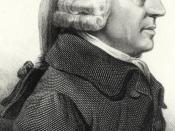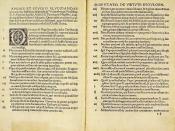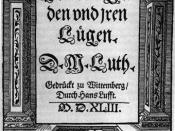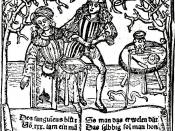Between the Middle Ages and the Enlightenment the rise of a number of related and competing ideologies, each held a powerful influence in their own time. Often extending well into the future, that influence continues to the present day.
The first important "ism" of the period was Conservatism, a reactionary philosophy supporting monarchy and the old ways. Championed by Edmund Burke, as a result of the horror of the French Revolution, Conservatism argued for a prudent and gradual change of society. Essentially, Conservatism stated life was outlined according to God's direct design, and thus wanted it to be that way. To question society was to question God, and to question God was to be condemned. The nobility were born intellectual and powerful, ruling over the peasants, born ignorant and needed to be guided by the elite. Using God and Christianity was justification enough for the ways of life in the Middle Ages.
Over time, the peasants became determined about pursuing strategies of self-interest as were members of the elite. Naturally, their field of action tended to be smaller but that made the efforts all the more intense. It's difficult to count the ways that peasants seized upon advantages in their situation, giving them the edge or privilege in dealing with those in power over them.
The beginning of the Renaissance in the mid-fourteenth century was marked by a turn from medieval life and values dominated by the Catholic Church toward the philosophical principles of humanism. The Italian people, especially the educated middle class, became interested in individual achievement and emphasized life in this world, as opposed to preparation for life in the next world, stressed by religion dogma. They believed strongly in the potential for individual accomplishment in the arts, literature, politics, and personal life. Individuals were encouraged to excel in a wide range of fields and showcase their talents.
Renaissance thinkers decried medieval life as primitive and backwards, looking back in history, to ancient Greeks and Romans, for inspiration. Church doctrine was forgotten for the classical ideals of the ancient.
Humanism was the philosophical backbone of the Renaissance, emphasizing the potential of the individual and stipulating that humans were rational beings capable of truth and goodness. This revolutionary new-found freedom allowed for free thought on a huge and drastic level. Events such as the Reformation followed from a similar humanistic concept.
Martin Luther's Protestant movement began in northern Europe, and by the mid-15th century had spread across Germany into Scandinavia and England. It back-lashed against the worldliness and corruption of Catholicism during the Renaissance, and also the Catholic tradition in general. Seeking to uncover a "pure" form of Christianity, in keeping with Jesus' original teachings, Protestantism was based on its own humanistic moral values. Through Protestantism, people began to question, doubt, and experiment with the working of society, from science to religion.
During the Middle Ages the canon of scientific knowledge experienced little change, and the Catholic Church preserved acceptance of a system of beliefs based on its own teachings. The medieval period had little scientific inquiry and experimentation. Rather, students of the sciences simply read the works of the alleged authorities and accepted their word as truth. However, during the Renaissance this doctrinal passivity began to change. The quest to understand the natural world led to the revival of the sciences. One of the first applications of the revival in the advancement of physics within the realm of biology. The physiology of the human body began to be understood in terms of its mechanical properties, and during the seventeenth century many of the mysteries of the human body disappeared. Newton's Principia, in which he lays out his comprehensive system of organization of the universe and develops the mathematical field of calculus, is seen as the key which unlocked the mysteries of the universe- the climax of the strivings of all of the Scientists of the Scientific Revolution.
The Enlightenment switched to a more independent ideology. Liberalism dominated and justified the Enlightenment. Consisting of businessmen and professionals, the liberals wanted a modern, efficient self-government. Although they were not always for universal male suffrage, they wanted freedom of the press and of assembly. They wanted constitutions, and Laissez Faire economic policies, such as free trade and low tariffs. From the Middle Ages through the Enlightenment, an explosion in new ideologies occurred. Largely, the "isms" were reactions to or products of Enlightenment thinking, although they all went in a variety of different directions. Many of the new movements dealt with ideas that had been around for a while; but it was only during this period that the ideas gained formal, coherent structure.





